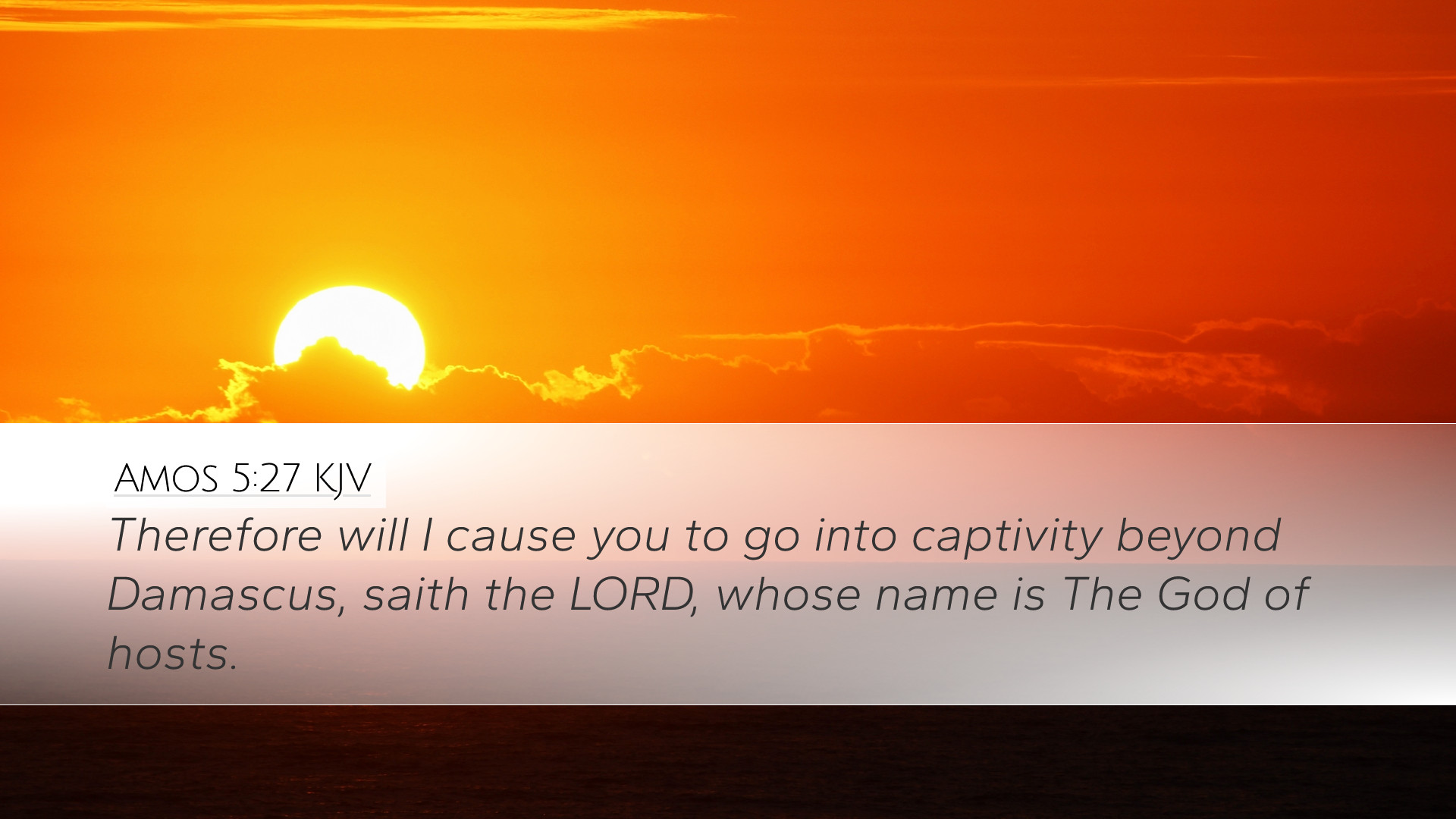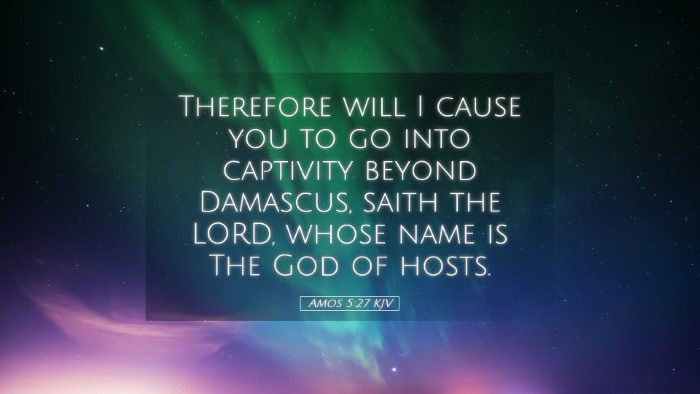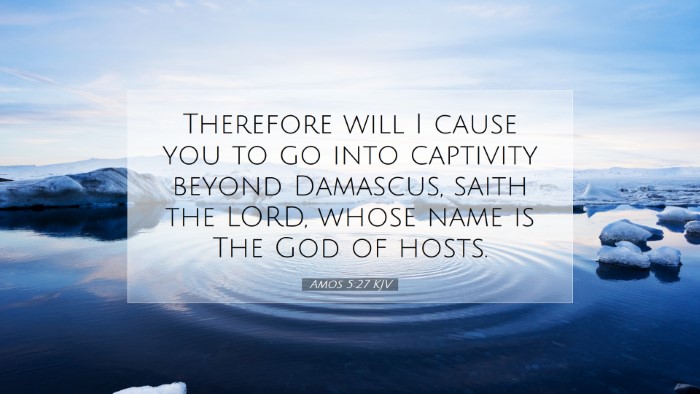Old Testament
Genesis Exodus Leviticus Numbers Deuteronomy Joshua Judges Ruth 1 Samuel 2 Samuel 1 Kings 2 Kings 1 Chronicles 2 Chronicles Ezra Nehemiah Esther Job Psalms Proverbs Ecclesiastes Song of Solomon Isaiah Jeremiah Lamentations Ezekiel Daniel Hosea Joel Amos Obadiah Jonah Micah Nahum Habakkuk Zephaniah Haggai Zechariah MalachiAmos 5:27
Amos 5:27 KJV
Therefore will I cause you to go into captivity beyond Damascus, saith the LORD, whose name is The God of hosts.
Amos 5:27 Bible Commentary
Commentary on Amos 5:27
Amos 5:27 states:
"Therefore will I cause you to go into captivity beyond Damascus, saith the Lord, whose name is The God of hosts."
Introduction
The verse encapsulates a profound warning from God through the prophet Amos to the people of Israel. This warning is not merely a threat but an indictment of their societal and spiritual failures. The importance of context and understanding the historical background of Amos's prophetic ministry is critical for deeper insight.
Contextual Analysis
Amos prophesied during a time of relative prosperity for Israel, yet this prosperity was coupled with moral decay, idolatry, and social injustices. The nation had turned its back on God, and the warning of impending judgment was an appeal to repentance. The phrase “beyond Damascus” symbolizes a complete removal from the land, emphasizing the severity of their impending punishment.
Theological Themes
-
The Sovereignty of God:
God declares His authority with the title "The God of hosts," highlighting His power over all nations and His control over history. This underscores the theological belief that God remains on the throne, sovereign and just.
-
Judgment and Discipline:
The Lord’s action of sending His people into captivity serves as a demonstration of divine judgment, not out of vengeance but as a necessary consequence of their actions. The captivity is portrayed as a disciplinary measure, intended to bring the people back to repentance.
-
Covenant Betrayal:
Israel's actions reflect a breaking of the covenantal relationship established by God. The call for repentance comes in the context of Israel's failure to uphold their part of the covenant.
Insights from Public Domain Commentaries
Matthew Henry's Commentary
Henry emphasizes that the charge against Israel is the injustice and oppression prevalent in their society. He notes that God's threat of captivity is consistent with the punishment of unrepentant sins. Henry suggests that this captivity is not the end, but the hope remains that it may lead to their eventual repentance and restoration.
Albert Barnes' Notes
Barnes provides an in-depth examination of the phrase “beyond Damascus.” He asserts that this reference indicates a punishment that extends beyond immediate geographical boundaries, hinting at a more extensive dispersal of the people. Furthermore, he highlights how God's name, “The God of hosts,” signifies both His majesty and His ability to mobilize all resources for judgment or deliverance.
Adam Clarke's Commentary
Clarke points out the significance of the captivity, equating it to a loss of identity and heritage for the nation. He stresses that the people’s failure to recognize the severity of their sins ultimately leads them into a condition where they are stripped of their autonomy and face dire times. Clarke uses this verse to call contemporary readers to reflect on their own spiritual standing before God.
Application for Today
This verse resonates with modern believers as it prompts crucial self-examination regarding our societal behaviors and spiritual integrity. Just as Israel faced divine judgment for its transgressions, the faithful today are called to reflect on personal and corporate spiritual health.
-
Call to Repentance:
The theme of repentance is ever-present. Individuals and communities are invited to turn back to God, acknowledging areas where they fall short.
-
Understanding Consequences:
The inevitable consequences of turning away from God must instill a healthy fear and reverence towards the Divine. Understanding the depth of Scripture provides wisdom to avoid similar pitfalls.
-
Hope in Restoration:
While the message bears weight and gravity, it also holds a thread of hope. Repentance leads to restoration, and God's ultimate desire is the restoration of His people.
Conclusion
Amos 5:27 serves as a somber reminder of the consequences of our actions as a nation and individuals. By drawing from the rich soil of biblical commentary, believers may find depth in understanding God's enduring patience, righteousness, and call for repentance. Let this verse instill both introspection and hope in the hearts of pastors, theologians, and students of the Scripture.


